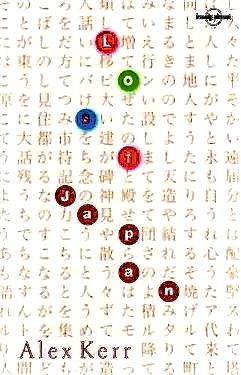 Lost Japan is an ode to an idealized, forgotten, and headily cultural past, written by an inveterate literati to whom pure artistic beauty is one of the loftiest goals imaginable. In this book we see the gentle beginnings of bugbears for the author that in time would evolve into the strident arguments of his masterwork- ‘Dogs and Demons: The Fall of Modern Japan’. But where that book is fiercely angry and relevant, this one is reverent, gushing, and more than a little soft around the edges.
Lost Japan is an ode to an idealized, forgotten, and headily cultural past, written by an inveterate literati to whom pure artistic beauty is one of the loftiest goals imaginable. In this book we see the gentle beginnings of bugbears for the author that in time would evolve into the strident arguments of his masterwork- ‘Dogs and Demons: The Fall of Modern Japan’. But where that book is fiercely angry and relevant, this one is reverent, gushing, and more than a little soft around the edges.
Lost Japan was first published in 1993 in Japanese, a collection of biographical shorts concerning the author’s life in Japan. It won the prestigious Shincho Gakugei literature award in 1994, the first time for a foreigner. In 1996 it came out in English from lonely planet, and was met with positive criticism, with numerous reviewers falling over themselves to espouse Kerr’s view of Japan as ‘unique’ and ‘brilliantly informed’.
Kerr first came to Japan in 1964 as the son of a US Navy family, and has been back and forth numerous times, living here for extended periods, buying a house in a remote valley, getting involved in cultural teachings, kabuki, calligraphy, and art collecting. The book is a series of vignettes about all these various aspects of Kerr’s life, with lavish detail poured upon the art of kabuki, interesting facts shared about the thatching of traditional Japanese houses, and an insider’s guide to the world of Asian art dealers. Throughout are the seeds of what will become the latter book ‘Dogs and Demons’, as he first considers the meaning of Japan’s concreted hillsides, the slow asphyxiation of kabuki under the weight of its own pomp and circumstance, and the ugly unorganized power line-striped morass of big cities like Tokyo. These are the things destroying the Japan that he loves.
I didn’t like it. I finished this book not out of any sense of enjoyment but out of a strange kind of indebted feeling to the author, after he blew my mind so thoroughly with ‘Dogs and Demons’. That book is an endless tirade of facts and figures and real history bearing out his suspicion that there is something seriously awry in the management of Japan. It was angry, raw, and it confirmed for me many experiences I’ve had in this country as a six-year resident, things I’d noticed but now accepted as the norm. I got angry alongside him. And I suppose all that colored my perception of ‘Lost Japan’. Where ‘Dogs and Demons’ bit hard and wouldn’t let go, ‘Lost Japan’ gave a slobbery knock-kneed smooch.
I tried to put the other book from my mind as I read, but just couldn’t get away from making the comparison. ‘Dogs and Demons’ was fiercely relevant to the way I look at Japan. It answered questions I’d long wondered about. It felt like it was important, and it mattered. ‘Lost Japan’ however did not feel important. It did not speak to me about Japan on any level that I care about. Kabuki? I went once, and fell asleep. Perhaps that says more about me than the book, but I couldn’t get past it. I couldn’t clean out the saccharine fluffy taste in the back of my mouth as I read of Kerr’s exploits in art dealership, calligraphy and numerous other flouncy seeming things. ‘So what?’ I wanted to ask. ‘What does it matter?’ How I managed to finish the final chapter gushing about Japan’s lost ‘literati’, essentially worthless rich bohemians who sat around and wore berets and smoked cigarillos and talked idly of ‘revolution’, I’ll never know, but it was a supreme testament to the other book that I did.
Basically, this book is the simpering wuss-cousin of the ferocious ‘Dogs and Demons’. If you’re interested in the ‘high art’ of Japan you’ll enjoy it. Otherwise, I wouldn’t bother.
